Every time an audio-based AI says my name, it is a reminder that AI is not designed for me. I have heard some outrageous pronunciations of my name, Sanjana (pronounced Sun-juh-na), throughout the years from Sayn-jay-na to straight up Sanjaya. The iterations of AI tend to butcher my name more than any human does.
AI is not designed for me.
This thought comes up time and time again as my life increasingly depends on data and technology. Whether it's gendered ads that prey on my insecurities or concerns about crude messages and unwanted images on dating apps without any safeguards, I am reminded that AI is not built for me. it’s not built for women.
I think about the countless stories that come out about the bias and harm that AI models have on women’s daily lives, from period tracking products being biased to revenge porn based on AI-created images that endangers women’s lives.
AI is not designed for women.
It’s not surprising though. If I think about who’s building these models, it’s mostly white, mostly men dictating the AI algorithms. Women still only make up 22% of AI professionals globally and 18% of all AI researchers are women. Of course it’s not designed for us; we’re barely in the room to influence!
More broadly, a pervasive gender data gap exists across industries. Women's data is consistently underrepresented in research, medicine, and countless other areas. Yet, data is at the core of everything we use—it’s embedded in our daily lives, influencing decisions from the partners we meet to the healthcare we receive. These technologies that are meant to serve everyone barely include our data!
It’s imperative, especially with the rise of Generative AI, for women not to be left behind. Women and girls are 25% less likely than men to know how to leverage digital technology for basic purposes. This is not okay. We need to understand these tools, recognize their limitations, and demand better technologies, research, and policies around AI that benefit and protect women.
Calling all the girlies.
I encourage you to question the technologies in your life and if it’s serving your needs. Let’s talk about the ways AI works for us and the ways that they could be so much better for us. On a more specific note, learn about deep fakes and AI-curated images. I'm wary of the generative AI image-altering capabilities being rolled out to the public through Apple's Intelligence on iPhones and Google Pixel's Gemini, and how these technologies could disproportionately harm women.
Let’s reimagine AI in a way that protects and empowers us. AI is so powerful, why shouldn’t it be designed for women?




